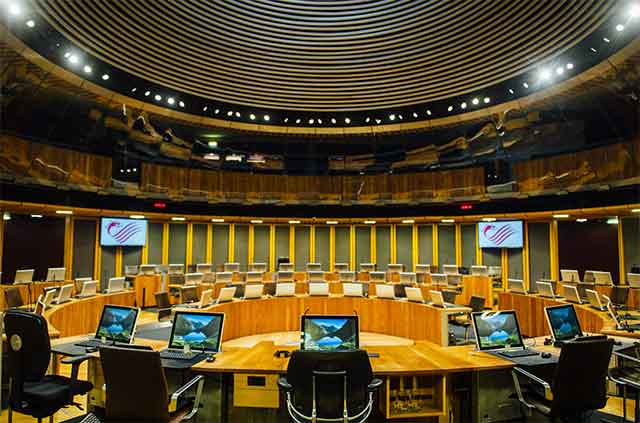The Senedd voted to back an independent commission’s recommendations on protecting devolution and strengthening Welsh democracy.
In one of his final acts as first minister, Mark Drakeford led a debate on the report of the independent commission on Wales’ constitutional future.
The commission, led by Laura McAllister and Rowan Williams, made ten recommendations including devolving rail infrastructure, policing, probation and youth justice.
Prof McAllister, an academic, and Dr Williams, a former Archbishop of Canterbury, identified three viable options: enhanced devolution, a federal UK, and independence.
However, the commission stopped short of endorsing any one option.
Outlining the Welsh Government’s formal response to the report, Prof Drakeford agreed with its overarching conclusion that the status quo is neither a viable nor secure foundation.
‘Fragilities’
The outgoing first minister said the shortcomings and fragilities of the devolution settlement were exposed while Boris Johnson was prime minister.
He accused the UK Government of turning its back on the Sewel convention which states the UK Parliament will “not normally” legislate on devolved matters without consent.
Prof Drakeford said repeated willingness to override the refusal of consent from the Senedd disrespects Wales’ democratic institutions and deprives the electorate of a mandate.
He told the chamber further powers must be about having the tools to support public services, strengthen the economy and improve the wellbeing of Wales
Prof Drakeford made the case for devolving powers over the Crown Estate, the administration of welfare benefits and parts of the criminal justice system.
‘Unnecessary and unsafe’
Mark Isherwood told the chamber the Conservatives would not endorse the report, saying further devolution now, or in the foreseeable future, would be unnecessary and unsafe.
Mr Isherwood warned Wales’ democratic deficit is still alive and kicking, with too few people not understanding how much power the Welsh Government has over their lives.
He said: “This perpetuates the one-sided nature of Welsh politics, allowing the ‘we know best’ Labour Welsh Government to dodge accountability.”
Mr Isherwood pointed out that Jo Stevens, Labour’s shadow Welsh secretary at Westminster, has rejected calls for more powers over policing and criminal justice.
The North Wales MS said: “We must ask why the Welsh Government is devoting so much time and resource to devolution of these matters when it is cutting key budgets elsewhere.”
‘Cronyism-infested’
Rhun ap Iorwerth described the report as a turning point in Wales’ constitutional journey, reiterating his call for the creation of a standing national commission.
He said: “Mark Isherwood mentioned the democratic deficit – what we’ve seen is a growing respect deficit in recent years being ramped up by the lack of respect for Welsh democracy.
“He speaks of bringing more powers to the people of Wales as if it’s a bad thing. He’s happy enough for the concentration of power in the hands of a cronyism-infested UK Government.”
Calling for urgency, the Plaid Cymru leader argued a piecemeal approach to powers over policing, probation and youth justice would make the edges of devolution more jagged.
He criticised “thin” responses to many of the commission’s recommendations, including on the devolution of the Crown Estate, broadcasting powers and rail infrastructure.
‘Financial unfairness’
Alun Davies, a Labour backbencher, said financial unfairness across the UK has dogged intergovernmental relations since the start of devolution.
He called for Wales to adopt Australia’s system which aims to ensure people, wherever they live, can expect a similar level of services from the state and federal government.
Mr Davies, who represents Blaenau Gwent, said: “That is what we should have here.
“It isn’t too much to expect that somebody living in Wales can expect to have the same quality of life and level of services as somebody living in Surrey or elsewhere.
“That doesn’t seem to be ludicrous, too radical and impossible to achieve – that should be the minimum that we want, and need, to create.”
‘Democratic innovation’
During the debate on March 19, Adam Price said the commission’s first recommendation – which centres on democratic innovation – is the most important of all.
Mr Price, a former MP and Plaid Cymru leader, argued politics has hardly changed since the late 19th and early 20th centuries.
He said: “It’s still people, every four or five years, taking a manifesto to an electorate, having a mandate then taking decisions on people’s behalf.
“There seems something out of kilter with modern culture and society in that, where people want to be directly involved and engaged in the decision making that affects their lives.”
The Carmarthen East and Dinefwr MS called for greater public participation in a reinvented democracy, with wider society helping to frame questions and provide answers.
‘Absurdity’
Replying to the debate, Mark Drakeford said he was astonished the word “unsafe” was attached to the report’s conclusions as he argued the status quo is indefensible.
Prof Drakeford raised the “absurdity” of the settlement, pointing out that Wales has powers over road, rail and cycling but is explicitly prevented from taking control of hovercraft.
He added: “I was sorry to hear that old chestnut being trotted out about the one-sided nature of Welsh politics. There is a very easy answer to that, isn’t there? And it’s just for the Conservative Party to get better at winning elections.
“The reason why Labour has been in power for the past 25 years is not because we won it in a raffle but because we persuaded people in Wales to vote for it.”
The motion to endorse the commission’s recommendations was agreed, 38-14, while a Conservative amendment to instead “note” the report was defeated, 14-38.

